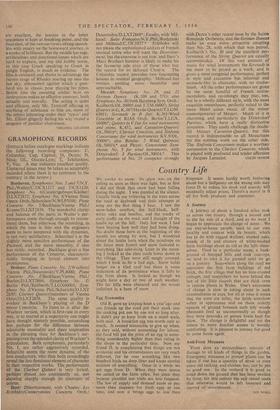GRAMOPHONE RECORDS
(INirmis before catalogue markings indicate the following recording companies: C, Columbia; Cap, Capitol; D, Decca; N, Nixa; OL, Oiseau-Lyre; T, Telefunken; V, Vox. A star indicates excellent quality. Unstarred issues may be taken as acceptably recorded where there is no comment to the contrary in the review.)
DesormiCre/DIXT2868*; Exalt's, with Mil- haud: Suite FrancaiseINN .Phil./Rodzinski and Milhaud/C.33C1027.* Sylphides will not please the sophisticated addicts of French musical satire who will want the Divertisse- ment, but the converse is not true, and lbert's Marx Brothers humour is likely to make his the favourite side even of those who buy the record for its debased Chop:n. The Columbia record provides two fascinating lessons in musical geography. Milhaud has written nothing more beautiful and approachable. Mozart: Symphony No. 29, and 12 German Dances (K.509 and 571): also Symphony No. 30/both Bamberg Sym. Orch./ Kul berth/OL.50005 and T.TM .68007; String Quartet in G, K.387/1-laydn Quartet/T.LG M. 65011; Serenade in B flat; K .361/Wind Ensemble of R1AS Orch.
66006*; Quintet in E flat for wind instruments and piano, K.452, and Cassation-Quartet/ OL.50016*; Clarinet Concerto, and Sinfonia Concertante for wind instruments KV.9/0L. 50006*; also Reicha: 2 Wind Quintets' OL.50019,* and Pleyel: Concertante AVM- phonie No. 5 for wind instruments, with Dittersdorf: 3 Partitas10 L.50014.* This performance of No. 29 competes strongly with Decca's other recent issue by the Suisse Romande Orchestra, and the German Dances make an even more attractive coupling than No. 28, with which that was paired. Kcilbcrth's No. 30 and the excellent per- formance of the String Quartet are equally recommended. Of this vast amount of music for wind instruments the Serenade is the most to be prized as a work, and is given a most congenial performance, perfect in style and execution but informal and serenade-like in character, with no studio- finish. All the other performances are given by the same handful of French instru- mentalists, and ravishingly they play, too, but in a wholly different style, with the most exquisite smoothness, perfectly suited to the more bland salon music of the minor contemporaries of Mozart. Much of it is charming, and particularly the Dittersdorf Partitas, which have a really distinctive invention. They easily challenge the doubt- ful Mozart Cessation Quartet, but this record is indispensable to all Mozartians for the sublime work on the other side. The Sinfonia Concertante makes a worthier companion to the Clarinet Concerto, which is played with profound and tender affection by Jacques Lancelot. COLIN MASON


































 Previous page
Previous page